Digital Humanities and the Museum: Engagement. Education. Empowerment.
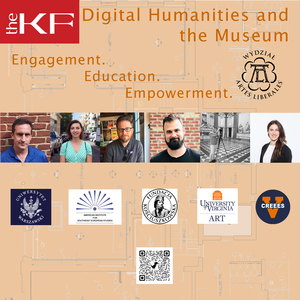
On 26 June, the Department “Artes Liberales” at the University of Warsaw, with the generous support of the Kościuszko Foundation, will be holding a roundtable on digital humanities in the museum. Our contributors will showcase how digital humanities have been implemented into public institutions and the effect digital humanities have had on engaging visitors, community outreach, and augmenting or altering dominant paradigms. The range of topics includes, but is not limited to, virtual galleries, virtual and augmented reality, 3D scanning technology, student engagement and empowerment, asynchronous pedagogical tools, and interactive learning. Our goal is to showcase and discuss how digital tools have been effectively used in the museum and the classroom, substance over style, and hopes and visions for the future of museums, galleries, and related pedagogy.
Date: June 26th 16:00 – 19:00 Warsaw | 10:00 -13:00 Eastern
Location: Dobra 72 "Biała Willa", Pokój 9, University of Warsaw, Poland
Virtual: Contact Daniel S. Weiss for Zoom link.
Speakers:
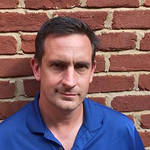
Daniel S. Weiss: Kościuszko Foundation Visiting Professor in "Artes Liberales,” University of Warsaw | Senior Instructional Technology Specialist, Department of Art, University of Virginia.
Prof. Weiss teaches a variety of art and music history courses with a focus on the ability of the student to demonstrate mastery. Most of his work concerns the use of digital technologies to augment existing goals of pedagogy, storytelling, and visibility. Additional research involves issues of classical reception, folklore tradition, and post-colonial identity in the Carpathian region as expressed through contemporary music.
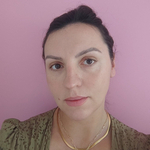
Ewa Drygalska: Polish-Japanese Academy of Information Technology.
Dr. Drygalska is a museologist who she has worked, among others, at the National Museum in Warsaw, the Frederic Chopin Museum, the Emigration Museum in Gdynia, and cooperated as a researcher with the Film School in Lodz. She teaches at the Polish-Japanese Academy of Information Technology and runs her own research company. Her research interests include social and philosophical aspects of technology.
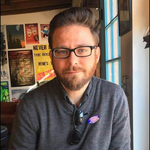
Edward Triplett: Assistant Professor of the Practice in the Art, Art History and Visual Studies Department, Duke University | Member of the Wired! Lab.
Prof. Triplett studies the architectural history of medieval Iberia, and the history and practice of premodern cartography using a variety of digital technologies. His field research and publications cover the architecture of Iberia’s (Christian) military-religious orders during the medieval period, and the fortified border between Portugal and Spain during the 15th and 16th centuries. He is the principal investigator of the Book of Fortresses and Sandcastle Workflow projects.
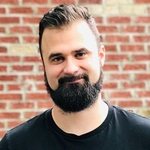
Justin Anthony Mann: Assistant Professor, Eastern Michigan University | Post-Doctoral Fellow, Dumbarton Oaks.
Prof. Mann has participated in a range of international archaeological projects in Greece, where he is currently a survey leader for the Molyvoti, Thrace, Archaeological Project. In addition, he has worked extensively with cultural resource management firms in the American Great Plains region. He was the recipient of a Fulbright Scholarship (Fulbright Greece 2019–2020) for his dissertation research on Byzantine monastic landscapes, and he has also held the University of Virginia’s Dumas Malone Graduate Research Fellowship and Kapp Family Fellowship. His research interests include Byzantine monasticism, landscape archaeology, human geography, and the archaeology of commodities.
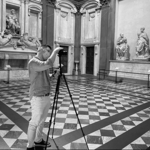
Eric R. Hupe: Assistant Professor of Art History, Lafayette College | Principal Investigator, ZeuxisVR: Immersive Art History
Prof. Hupe studies the relationship of art, optical science, and theology in early modern Italy. His current book project, Venetian Perspectives: Art, Optics, and Theology in Renaissance Venice, uses pictorial light as a lens to explore the history of optics and perspective in Venice. Professor Hupe is the Principal Investigator for ZeuxisVR: Immersive Art History a digital initiative that creates virtual reality environments of art historical sites to advance teaching and research.
Moderator:
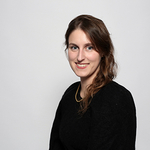
Monika Stobiecka: Assistant professor at the Faculty of "Artes Liberales”, University of Warsaw.
Dr. Stobiecka is a member of the Young Scholars Academy of the Polish Academy of Sciences, a fellow of the Lanckoroński from Brzeź Foundation (2016), the Kościuszko Foundation (2018), the Foundation for Polish Science (2019) and one of the cofounders of the Central Eastern Europe Chapter of Association of Critical Heritage Studies. Her research interests include political and ethical dimensions of heritage, digital heritage, archaeological museum studies and the intersection of contemporary art and archaeological theory.
Special thanks to:
The Kościuszko Foundation, Wydział “Artes Liberales” at the University of Warsaw, The American Institute for Southeast European Studies, The University of Virginia Department of Art, and the Center for Russian, East European and Eurasian Studies at the University of Virginia.
Digital Humanities and the Museum: Engagement. Education. Empowerment.
26 czerwca 2025 r. na Wydziale „Artes Liberales” UW odbędzie się debata poświęcona roli humanistyki cyfrowej w muzeach, organizowana przy wsparciu Fundacji Kościuszkowskiej.
W ramach dyskusji zaproszeni prelegenci zaprezentują, w jaki sposób narzędzia cyfrowe są wykorzystywane w instytucjach publicznych – nie tylko jako innowacje technologiczne, ale jako narzędzia realnej zmiany w zakresie edukacji, zaangażowania odbiorców oraz przełamywania utartych schematów myślenia o kulturze.
Zakres poruszanych tematów obejmuje między innymi:
– wirtualne galerie,
– rzeczywistość wirtualną i rozszerzoną,
– technologie skanowania 3D,
– zaangażowanie i wzmocnienie pozycji studentów,
– asynchroniczne narzędzia dydaktyczne,
– interaktywne formy nauczania.
Rozmowa będzie dotyczyć efektywnego i przemyślanego wykorzystania narzędzi cyfrowych w muzeach i edukacji. Szczególny nacisk zostanie położony na konkretne rozwiązania oraz kierunki rozwoju instytucji kultury w kontekście zmieniających się realiów technologicznych i społecznych.
Spotkanie odbędzie się 26 czerwca 2025 roku w godzinach 16:00–19:00 czasu warszawskiego (10:00–13:00 czasu wschodniego, USA) w siedzibie Wydziału przy przy ul. Dobrej 72 (sala nr 9).
Osoby zainteresowane udziałem zdalnym proszone są o kontakt z prof. Danielem S. Weissem (dsw5k@virginia.edu) w celu uzyskania linku do spotkania na platformie Zoom.
